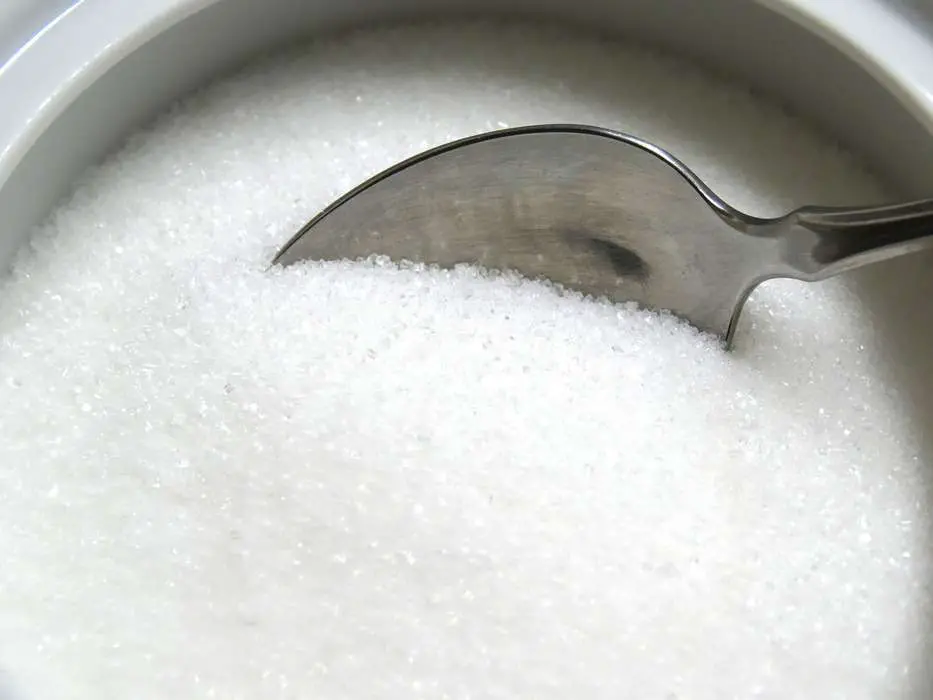For those following the keto diet, it’s commonly known that sugar is simply out of the question.
As a carbohydrate, sugar is the exact antithesis to what your body needs in order to stay in a state of ketosis, and optimally continue burning fat and ketones for fuel.
However there are still ways to enjoy sweets and sweeten your meals without risking all of the hard work that you’ve put into your diet. Sugar substitutes and alternatives can be a great way to supplement your meals and beat those sweet cravings without taking in too many carbs.
As a seasoned keto dieter, I’ve tried almost every sugar substitute in one way or another, and they all tend to affect the body in different ways. In this article, I’m going to break down one that’s commonly found in pre-packaged foods and beverages – maltitol.
What Is Maltitol?
Maltitol is characterized as a sugar alcohol, which, like sugar, is considered to be a carbohydrate. While sugar alcohols can naturally be found in fruits and vegetables, they can also be artificially manufactured, which is why maltitol is often found in packaged and processed foods.
Artificially, it is made from maltose, which is the same base for another popular sweetener, maltodextrin. Maltose is derived from wheat and corn, and is created by utilizing enzymatic hydrolysis of the starch. This product is then subjected to catalytic hydrogenation, and finally filtration – essentially, it’s a heavily processed component of a lot of foods.
Despite being heavily processed, it is still safe to consume in most countries, including the United States.
Sugar alcohols such as maltitol are generally sweet, though are technically less sweet than sugar, and tend to have slightly fewer calories than sugar. Despite the name, they also don’t contain any actual alcohol.
Maltitol has been described as tasting similar to that of sucralose, another non-sugar sweetener. As a sugar alcohol, it’s often considered to be an alternative sweetener and substitute for table sugar.
You’ll often find maltitol in the following popular foods and beverages:
- Sugar-free chocolates
- Sugar-free chewing gum
- Sugar-free candies
- Fondant and other types of frostings
- Ice cream and other types of dairy deserts
- Energy bars
- Cream and fruit fillings for baked goods
- Pre-packaged baked goods
Benefits of Maltitol
Broadly, maltitol doesn’t really have a lot of benefits for consumers, though it’s efficiency as a processed sugar alcohol has a lot of benefits for food manufacturers. The biggest general benefits for us consumers include:
-
Low in calories
If you choose to replace maltitol for sugar in equal proportions, you will achieve a small caloric deficit when comparing the two end dishes. This might be particularly beneficial if you are a person who typically gets a significant portion of their calories from foods high in sugar. Furthermore, maltitol does have the potential to help people wean off of sugar entirely, if you replace in equal proportions, and then slowly decrease the amount you use each time.
However among other sugar replacements, this isn’t always as possible, because maltitol is actually hard to find on it’s own. It’s typically not sold for individual purchase in most grocery stores, but is rather included in products after being purchased, or derived in bulk by food manufacturers.
-
Lack of an aftertaste
A big problem with a lot of alternatives to sugar is aftertaste. It may not be the worst side effect of them all, but it’s one that definitely hurts the objective of staving off sugar – after all, sugar is sweet and delicious, a replacement shouldn’t make you feel worse after eating it.
Being able to stick to a sugar substitute like maltitol depends largely on one’s enjoyment of it, and sticking to sugar substitutes long term offers a lot of potential health benefits.
-
No negative impact on teeth
This is a big one. Sugar has long been proven to have negative lasting impacts on the health of our teeth and gums over long periods of time. The most frequently experienced side effects include cavities, enamel decay, increased risk of developing gingivitis, and tooth loss altogether.
Fortunately, maltitol has proves to be much better for your teeth and gums than sugar. While it isn’t the most tooth-friendly sugar substitute, it is definitely a better option than sugar when comparing the two.
For example, one recent controlled study discovered that among people who did not regularly brush their teeth, those that chewed gum with maltitol and xylitol experienced significantly reduced cases of gingivitis compared to those who chewed gum flavored with regular sugar.
-
Potential protection against colon cancer
A lot of other effects of maltitol are starting to become more clear as research continues.
One recent study in rats discovered that incorporating maltitol into the test subjects’ diets actually helped to protect against against colon cancer. Rats who were given maltitol regularly as a part of their diets were only 53% as likely to develop colon cancer as those who were not given any maltitol at all.
-
Potential help for fighting the effects of liver disease
Another potential benefit to our health that maltitol might be able to provide is it’s effects on liver disease.
In a study using mice who were in the beginning stages of developing liver disease, those who were given maltitol for 8 weeks experienced less weight gain, lower blood sugar levels, and lower cholesterol levels, which are all opposite to typical side effects of liver disease.
Side Effects of Maltitol

After taking a look at those benefits, it’s important to analyze the side effects that you might experience when eating foods and drinks that contain maltitol. As you’ll see, for a lot of people, including keto dieters like myself, maltitol’s bad doesn’t really outweigh the good.
-
Digestive problems
Some people, depending on a variety of factors, who consume maltitol regularly, particularly if consumed in large quantities, might experience some moderate levels of intestinal gas and cramping. Others however might even experience more severe versions of cramping as well as diarrhea.
These tend to be common side effects for some groups of the population. That’s why it’s important when deciding on a sugar substitute, to ease into it by only replacing sugar with it sparingly, to gauge how your stomach and entire digestive system will handle it, before consuming it in larger amounts and more frequently.
-
Causes problems for those with Irritable Bowel Syndrome
People who struggle with irritable bowel syndrome, or IBS may unfortunately be more likely to experience accompanying stomach pain, diarrhea, bloating, nausea, and gas when consuming maltitol regularly. This is true of most types of sugar alcohols, which should probably be avoided by those who are struggling with IBS.
-
High Glycemic Index for those struggling with diabetes
While it has a lower glycemic index value than sugar, maltitol still does have a relatively high glycemic index, meaning that it still can spike your blood sugar, which is bad for both keto dieters and especially for those who are struggling with diabetes.
Anyone who is following the ketogenic diet, or who is diabetic should keep close track of their maltitol and carbohydrate intake for this reason.
-
Maltitol contributes to carbohydrate intake
As mentioned above, maltitol is characterized as a carbohydrate, so consuming foods that contain it, even if they don’t contain any sugar, still need to be added to your carb counts.
While many people assume only sugars count against fiber when calculating net carbs, it’s actually both sugars and sugar alcohols that need to be counted against fiber. So even though it’s a sugar substitute, you’re still getting the same amount of carbs as you would sugar most of the time.
Is Maltitol Keto-Friendly?
While maltitol has fewer calories and a slightly lower glycemic index value than traditional sugar, it’s still classified as a carb, and should only be consumed in moderation when following a ketogenic diet. Compared to all of the other sugar substitutes available, I’d say maltitol isn’t very keto-friendly.
Because of this, I’ve laid out some of my favorite keto-friendly sugar alternatives below.
Maltitol Compared to Other Sweeteners
-
Monk Fruit
Monk fruit is one of my favorite keto-friendly sweeteners. Derived from the luo han guo plant, it’s about 200 times sweeter than sugar, without the same amount of calories or high glycemic index level.
Compared to maltitol, it’s a much safer option for both those with diabetes, and for those who just want to make sure that they stay in ketosis.
One of the drawbacks of monk fruit is that it’s pretty expensive, because it needs to be concentrated into an extract or powder in order to be added to foods and drinks first.
-
Allulose
Allulose is comprised of a monosaccharide that is usually found in small quantities within certain types of wheat, brown sugar, fruits, and maple syrup.
A big benefit of allulose is that it technically contains zero calories and has no glycemic index value at all. This is because after it is consumed, it is entirely excreted by the body before it has a chance to be digested and processed.
Unlike maltitol, it’s also much lower in calories, coming in at only 30 calories per 100 grams.
-
Erythritol
Erythritol is also characterized as a sugar alcohol, but this kind is much different because it comes from natural sources, and doesn’t have a high glycemic index level. It is also much lower in calories, which makes it a more effective sugar replacement for those trying to watch their calorie intake as well as their sugar intake.
Compared to maltitol, erythritol has much more mild side effects as well. It has no common connection to indigestion and bloating, and it also fortunately does not bear a significant after taste like other types of sugar substitutes.
-
Xylitol
Xylitol is a comparable artificial sweetener. It also doesn’t cause any damage to dental health, which is a big plus.
More importantly, xylitol has little effect on blood glucose levels, and has few side effects altogether.
One of the bigger drawbacks of xylitol is that it isn’t as heat stable as other sweeteners, so you’ll be less likely to find in sugar-free baked goods and products most of the time.
-
Stevia
Stevia is a commonly used sweetener on the keto diet. It is derived from the leaves of the Stevia rebaudiana plant, and is fairly cheap to both make and purchase, and it’s easily available at most grocery stores.
Like monk fruit, the active ingredients in stevia are roughly 200 times sweeter than table sugar, while still having zero calories, and less of an effect on your blood glucose levels than sugar.
Stevia is also incredibly heat-stable, which means it can be more easily be cooked into foods compared to other natural and artificial sweeteners.
Final Thoughts
Ultimately, any of the above sweeteners mentioned would probably be better for keto dieters than maltitol.
These sweeteners are much more friendly to our bodies’ blood glucose levels, and aren’t as heavily processed as sweeteners like maltitol, dextrose, maltodextrin, and sucralose.
While it isn’t inherently keto-friendly, you shouldn’t focus too much on avoiding maltitol during your everyday life. However a best practice of the keto diet is to always check labels and serving sizes, especially with sugar alternatives.

